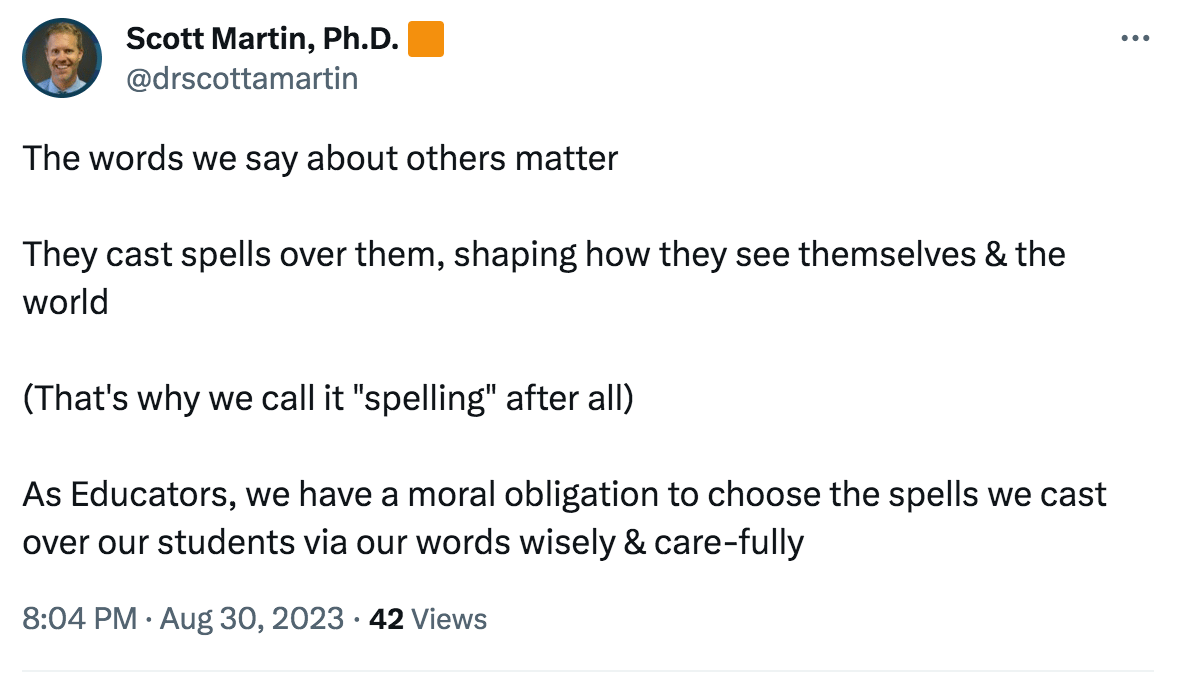
What we think about ourselves, the mental tape that runs in our head, is a hardwired program that controls just about everything we do in our lives
Research shows that our actions are influenced by the “self-talk” we have in our heads based in large part on the words spoken over us all our lives.
We have been hardwired from the first day we drew breath to believe the words spoken about us, first from our parents and guardians, to kindergarten teachers, to aunts and uncles, to soccer coaches…to literally everyone with whom we interacted
Research in psychology and neuroscience tells us that the words spoken over us matter in shaping our identities that influence our decisions that lead to our actions.
The things we have been told about us become what we believe to be true in us.
We judge ourselves, make decisions, believe truths, and hold dear those things we have been told about ourselves that then become the internal “self-talk” that we tell to tell ourselves.
Our thoughts are biochemical electrical impulses that guide our brains to making decisions that impact the direction of our lives.
And these thoughts are birthed out of the words spoken over us by others.
For better or worse, we are the product of the self-talk given to us by others long before we could do much about it
Feelings of inadequacy, failure to measure up, unworthiness, shame, negativity, criticism, self-doubt…these come from the tapes of self-talk we play in our own heads from the words spoken over us by others
I will give one telling example from my own life:
When I was in eighth grade, my math teacher called me up to the board to work out a problem in front of the class. I struggled with it, got the wrong answer, and felt stupid. My teacher looked at me and said, “Go ahead and sit down. You will never understand this”. To this day, I still feel like I am not smart in math in large part because of the words this man said.
WORDS HAVE SIGNIFICANT POWER AND IMPACT
For many ancient cultures, words literally had magical properties:
-from incantations that opened special doors (abbra cadabra)
-to runic letters engraved on signs that carried mystical power (we still see Celtic runes on signs in Wales and many tattoo them on their body)
-to wizards casting spells in a strange tongue
Words have always had an otherworldly alchemy to them, carrying inside them the ability to transform, to make things appear, to cause situations to come to be

Words have power…and they always have
In his book, Words Can Change Your Brain, Dr. Andrew Newberg, a neuroscientist at Thomas Jefferson University, writes:
A single word has the power to influence the expression of genes that regulate physical and emotional stress
Think about that
A single word has the power to influence us deep down in the marrow of our DNA
The power of a single word….
The ancient mystics had it right:
Words impact us deep down at the genetic level, harnessing the ability to influence even our physical and emotional states
The words spoken over us literally cast spells (that is why it is called “spelling” after all) that weave the very fabric of our lives: the thoughts we have about ourselves, the “self talk” going on inside our heads, the constant tape of internal dialogue that fuels how we see ourselves and what we believe to be true about us.
As educators, therefore, we have a moral obligation to choose carefully the spells we cast over our students via the words we use
And by words, I certainly mean both the verbal words we use and the non-verbal “words” that speak every bit as loudly and cast spells every bit as powerful
We cast spells over students when we hand them back a paper bloody with red ink highlighting in visceral detail their “mistakes”
We cast spells over students when we only call on the “smart” kids in class
We cast spells over students when we give low grades without allowing students the chance to learn, edit, and grow as thinkers
We cast spells when we hand out certain math books to certain kids and other math books to other kids in third grade
We cast spells when we label kids “troubled” or “hard to teach”
We cast spells when we chew our players out in front of the entire basketball gym for missing a layup
We cast spells when we as teachers only call home with bad news
We cast spells when we as administrators only interact with students during a disciplinary matter
We cast spells over students in a myriad of ways that weave disappointment, negativity, failure, inadequacy, anxiety, stress, isolation, loneliness, and low self-esteem that will direct the shape of their lives for decades to come
In their neuroscience experiment, “Do Words Hurt?”, Maria Richter and collaborating scientists monitored subjects’ brain responses to auditory and imagined negative words.
During this process, they discovered painful or negative words increase stress and anxiety-inducing hormones in subjects.
According to the study’s abstract,
Ultimately, negative words, whether spoken, heard, or thought, not only cause situational stress, but also contribute to long-term anxiety.
The good news is, we can also use the magical power of our words to weave spells of blessing, encouragement, gratitude, belief, and hope in our students
We cast spells over our students when we greet them at the front door with a fist bump and a word of thankfulness that they are there
We cast spells when we call out what we liked about their work, what stood out to us, what impressed us, what we learned
We cast spells when we show up to cheer for them at their JV softball game and then tell them how proud we are of them for their effort on the field
We cast spells when we shout them out for some positive quality we see in them
We cast spells when we call home to let parents know how thankful we are to have them in our class
We cast spells when we call them into our principal’s office to tell them how much we believe in them
We cast spells when we stop to listen to them talk about passing their driving test
Never underestimate the magical properties your words have on the students in your care
“You can do this”
“I believe in you”
“I am thankful you are here today”
“I am so proud of you”
These are not just words…they are spells that weave belief, optimism, affirmation, value, identity, and belonging over our students that have the power to shape their lives for decades to come
Be the spell weaver whose words cast the spell of encouragement, validation, and affirmation that transforms the inner dialogue in your students’ heads to uplift, inspire, influence, and encourage them on their journey through life

Dr Scott Martin
